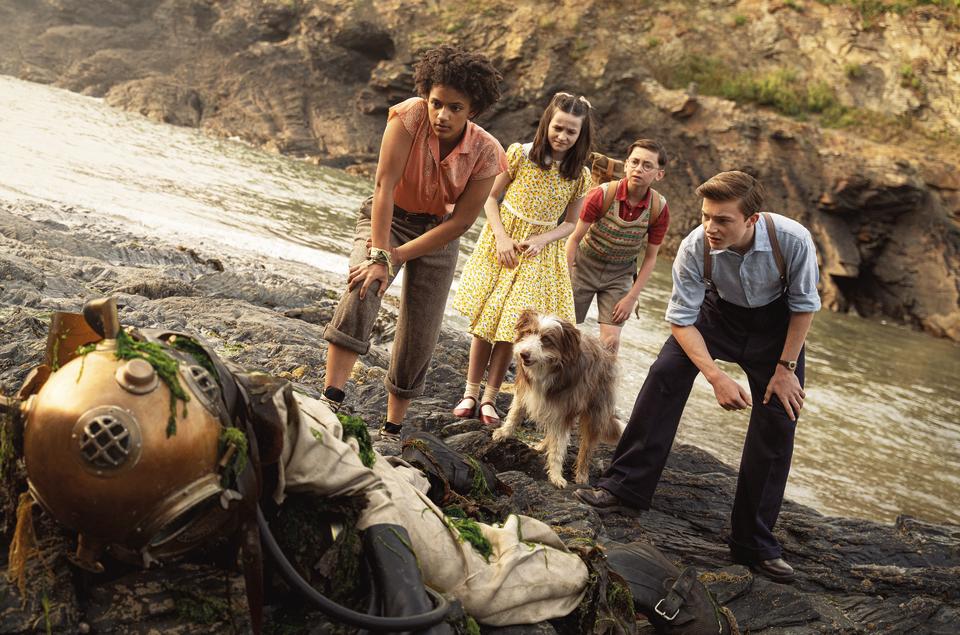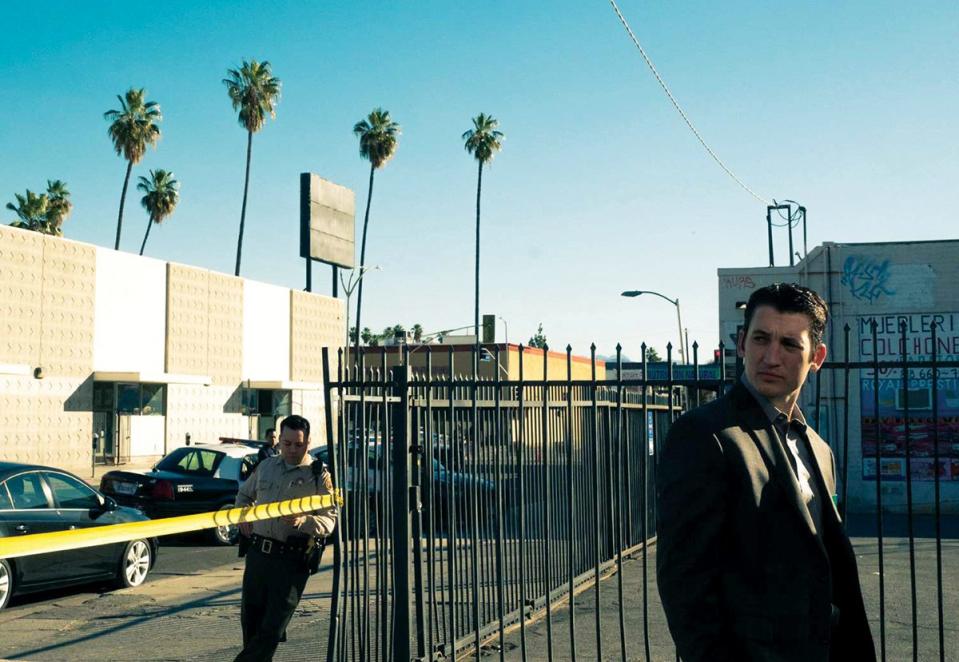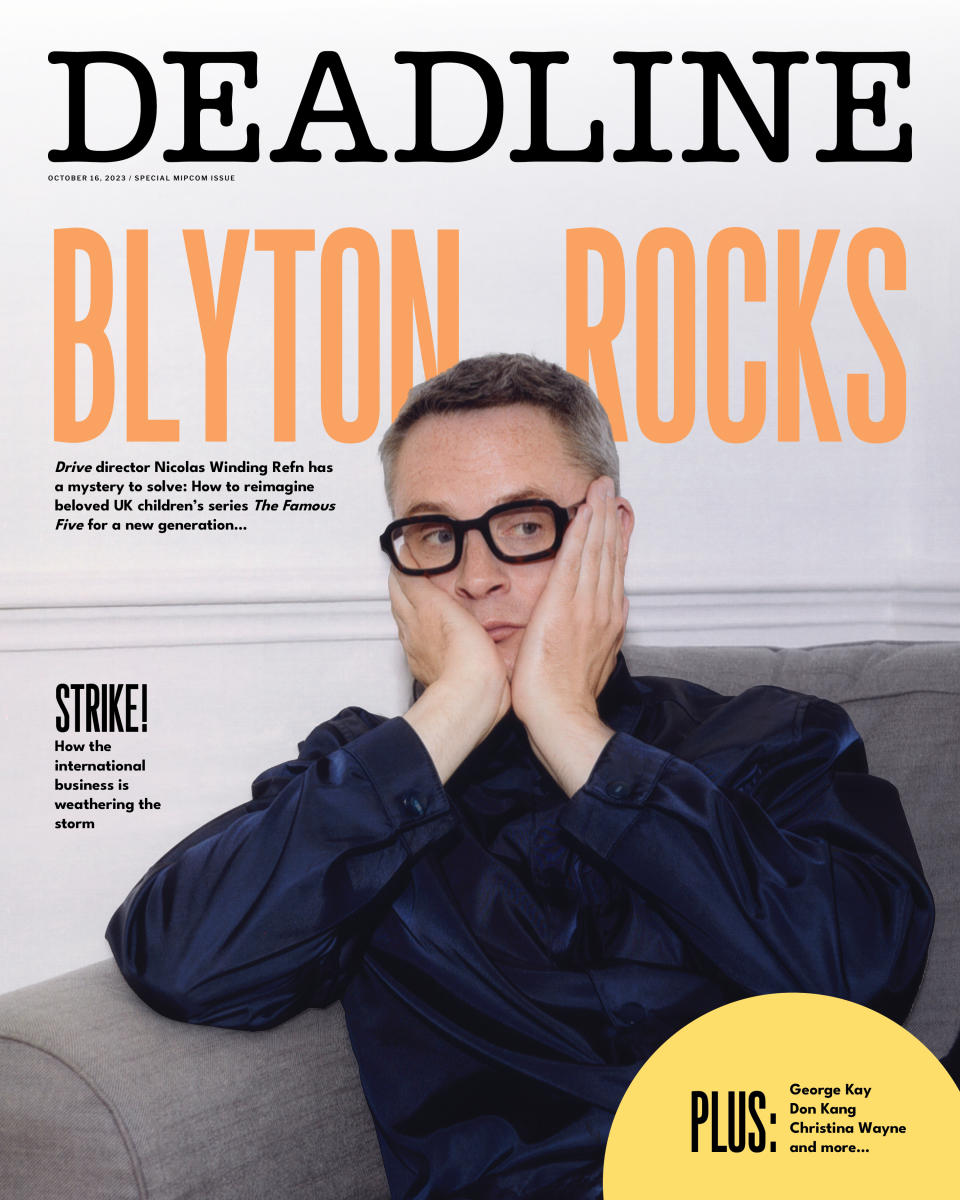“I’m Finally Making Something That My Kids Would Actually Watch”: Nicolas Winding Refn Talks Adapting Enid Blyton’s ‘The Famous Five’ For TV – Mipcom Cannes Special
- Oops!Something went wrong.Please try again later.
- Oops!Something went wrong.Please try again later.

EXCLUSIVE: There is a little-discussed Hollywood rumor, explains Nicolas Winding Refn and his long-time collaborator Matthew Read, that Scooby Doo only came to be because Warners failed to land the rights to adapt The Famous Five.
And when you look at the two properties and their uncanny similarities, this argument does begin to hold some weight. Both have daring female characters from a bygone era, ridiculous story-of-the-week capers that always end neatly, and, of course, those lovable pooches — in the former case Scooby and in the latter, Timmy.
More from Deadline
If the rumor is true, Winding Refn is thankful for how things played out, as he credits both generation-traversing works with influencing his career and driving his love for the screen. Now, more than 50 years on from when Warner Bros. allegedly failed to land the rights, the Denmark-born director has become the latest to take on best-selling English children’s writer Enid Blyton’s iconic novel series, pairing with The Pursuit of Love producer Read.
Speaking exclusively to Deadline as BBC Studios readies to launch sales on the BBC/ZDF series at Mipcom, Winding Refn, who is creator and executive producer on the project, casts his mind back to his moving to the U.S. as a scared, dyslexic child who spoke little English.
“I didn’t read until I was 13 so TV was a big thing for me as an eight-year-old coming to the States,” explains the Drive and Bronson director. “Scooby Doo had something that just magically transported me into this adventure land, so this feels like a very full circle that’s coming to completion. And I’m finally making something that my kids would actually watch.”

Through watching Scooby Doo, which has spawned more than 300 episodes that continue to air as well as movies and specials, Winding Refn says he was “visually and literally very much indoctrinated by a Famous Five iconography.”
Blyton’s 21 novels from the series are perhaps her best-loved work, although not uncontroversial (more on that later). Today, millions of kids continue to read the children’s adventure books, proving they are standing the test of time. Kicking off with 1942’s Five on a Treasure Island, they follow Julian, Dick, Anne, George and, of course, Timmy, who get caught up in an adventure each time they come together — experiences that often involve criminals or a lost treasure. They are pure escapist classics and have been adapted for the big and small screens multiple times — most recently airing on the BBC in 1995, an adaptation penned by Brit scribes Richard Carpenter, Helen Cresswell and Alan Seymour.
“I’ve always liked the concept of not really wanting to be an adult; staying in ‘adventure land’ forever,” Winding Refn says. “The Famous Five feels like one of the very few things that you literally hand down the generations.”
Forging a TV version has been at the back of Winding Refn’s mind throughout a two-decades-long career. Last year, Read picked up the rights for the book series via his BBC Studios-backed Pursuit of Love producer Moonage Pictures, eventually bringing on board Winding Refn’s outfit byNWR.
For Read, who worked with Winding Refn on Only God Forgives, Pusher and Valhalla Rising, and who even named one of his children after the director, there was only ever one person for the gig.
“To bring these stories to the screen and make them relevant for a modern audience, I was very aware you needed someone with real vision,” says Read, who is a co-creator, EP and wrote the first episode of The Famous Five.
“I knew from my friendship with Nicolas that there was an opportunity to do something in this space and create something for a broad audience that retains the ‘fantastique,’ the adventure, the uniqueness of the vision that’s in his work. It was always in the back of my mind, but I didn’t want to talk about it until we had the rights.”
Having aired a fun-for-all-the-family version of Oliver Twist last year titled Dodger, the BBC is keen on stories like The Famous Five and landing a greenlight for three feature-length episodes was relatively straightforward, with ZDF also boarding and France’s TF1 pre-buying. Deadline understands that more deals are in the offing.
Several times during our chat, Winding Refn and Read, who previously bonded over their love of British filmmakers like Hitchcock and Pressburger, stress the element of “fantastique” they wanted to imbue on their version.

That “fantastique” has been present in some form in many of Winding Refn’s works throughout the years. He has nurtured a reputation for a dark, underground, highly stylized approach that has spawned the likes of Ryan Gosling-starring Cannes breakout Drive, opinion-splitter Only God Forgives and, more recently, TV shows such as Netflix’s Copenhagen Cowboy. But Winding Refn shrugs off the notion that his Famous Five will be overly stylized, stressing a commitment to making the show “exciting, entertaining, thoughtful and inspiring.”
Read notes that “scholars [of Winding Refn] will enjoy spotting the thematic connections.”
Winding Refn and Read say they balanced the need for authenticity with a desire to retool works published as long ago as the 1940s for a modern audience. “We were asking ourselves how we take something that has obviously been duplicated multiple times and refresh it while retaining the DNA,” Winding Refn says. “Kids are so much more assaulted with stuff nowadays, so growing up has become much more complex and challenging than when the books were published.”
“Countercultural significance”
The pair sought inspiration from surprising places, including The Who’s iconic mod movie Quadrophenia, which became, for them, the inspiration for heroine George Kirrin’s “countercultural standpoints.” She is the de-facto leader of the gang, a tomboyish adventurer with a fiery temper. Winding Refn brands her “the anchor for the narrative, the foundation for The Famous Five.”
“The UK has such a countercultural significance,” he says. “At that time [when Quadrophenia was released], touching upon gender, class structure and all those things gave us a lot of material that today you can really develop into a clearer direction. Maybe further in the past this was more hidden in the shadows but here there was a lot of material to go with.”
Recently, the so-called culture wars have led to alterations made to books from the past and The Famous Five has not been immune to that trend. While it was Roald Dahl reworks that really dominated headlines, recent editions of The Famous Five have been stripped of words such as “gay” and “queer,” and phrases including “don’t be an ass” and “shut up.”
Did Winding Refn and Read much pay attention to the chatter?
“Most things related to the alternation of past culture unfortunately come down to financial gain for the institutions monetizing them,” says Winding Refn. “You can’t run from what history was and is — nor should we like it or agree with it — but we can’t deny its existence. Every generation rebels against its past definitions. There’s nothing new here.”
Read, intriguingly, tells us the “expression of our attitudes towards the controversies that have arisen from Blyton’s work in the past is in [our] adaptation.”
He took a more hands-on approach than Winding Refn during filming of the Tim Kirkby-directed series, attending most of the shoot in the southwest of England, while the Danish director remained in his home country (he speaks to Deadline from his mother’s house). “Sometimes you need to give people the freedom to interpret and run with what you give them rather than breathing down their necks,” Winding Refn says.

Casting was integral and the team were rigorous. Winding Refn describes finding the four main characters as “a puzzle.”
“It all had to match,” he says. “You find something you fall in love with but then that doesn’t equate with something else, and then you have to redesign the entire thing. It can be a tedious process.”
They settled on relative newcomer Diaana Babnicova in the “anchor” role of George, alongside Elliot Rose as Julian, Kit Rakusen as Dick and Flora Jacoby Richardson as Anne. For the adults, Ted Lasso star James Lance was cast as George’s scientist father Quentin, while the creators were keen to throw some fresh antagonists into the mix. Jack Gleeson, best known as Game of Thrones’ Joffrey Baratheon, is a major draw as Wentworth, a Moriarty-esque figure who will act as a foil in multiple episodes and, hopefully, for many seasons down the years, if the BBC and ZDF choose to hit the recommission button.
Refn on streaming
Winding Refn hasn’t made a show for a public broadcaster since directing an episode of ITV’s Marple 15 years ago and his last two projects have been for streamers: Copenhagen Cowboy for Netflix and Prime Video’s Too Old to Die Young.
Last month, he had some choice words for the global streaming behemoths, blasting them during a Venice Film Festival Masterclass as being “overfunded and rotten with money and cocaine,” according to reports.
Qualifying these comments, Winding Refn — who has also previously forecast the death of cinema — stresses that he would be happy to work with the SVoDs in the future but “was confirming something that we are all struggling with in our media landscape.”
“We are maybe speaking less about why we are making content rather than just making content,” he elaborates. “So much money is rolling into something that essentially is becoming more click-based. The global debate is around why people are tuning out so quickly rather than tuning in, and I believe that has a lot to do with what we are producing.”

Winding Refn believes a conversation around the “oversaturated” content market needs to take place between streamers, broadcasters, producers and distributors alike, facing up to the question of why “people are spending more time figuring out what not to watch [than what to watch].” “Failing to see the emperor’s new clothes is obviously a big mistake,” he says.
As this magazine goes to press, however, the dual labor strikes have slowed Hollywood production to a standstill. (WGA has settled its strike, but SAG-AFTRA is still in negotiations with AMPTP.) Winding Refn, who has been working in America and with Americans for years, describes the unions’ actions as yet “another representation of the enormous inequality that our modern world is heading towards.”
“I believe that’s a great catastrophe,” he says. “So, it’s time for us to unite because the world is a lot happier when we share, rather than fight, over resources. We need to be a bit more [It’s a Wonderful Life character] George Bailey.”
Citing a famed underdog character like Bailey is apt when we come back to the project that Winding Refn and Read have come together to promote. It is precisely that romanticism — the dream of a simpler time when families could gather Famous Five-style to take on the world’s ills — that is driving them forwards.
“We both grew up with analog television and this idea of a certain time and a certain day when everyone gathered round an event,” Winding Refn says. “That doesn’t exist anymore, and so we throw things back to a romanticized ideology, where television was a collective experience.”
Best of Deadline
2024 Presidential Election Debate Schedule: Dates, Times, Who'll Be There And Who Won't
2023 Premiere Dates For New & Returning Series On Broadcast, Cable & Streaming
Sign up for Deadline's Newsletter. For the latest news, follow us on Facebook, Twitter, and Instagram.

